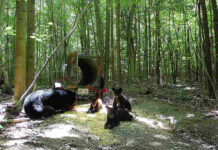ORWELL, Ohio — A key part of Magyar Farms in Ashtabula County is making changes, and those changes are why the farm is still productive today — 102 years later.
Jeff Magyar and his family milked cows until 2007, when they made the switch to focus only on growing grain. The farm had been leaning toward grain in the years leading up to the transition, and following the death of Jeff’s father, Robert, in 2008, the Magyars became a full-time grain operation.
Today, the family farms about 3,000 of their own acres and rents an additional 550-600 acres in Ashtabula and Trumbull counties. The Magyars grow corn, and food-grade soybeans that are marketed to Japan.
The farm also operates public grain storage in partnership with Centerra Co-op, which gives farmers a local market to sell their grain.
The Magyars began their grain storage operation about eight years ago, with what was then known as Western Reserve Farmers Co-op. That cooperative merged with Centerra in the spring of 2017.
Family effort
Although Jeff, 55, oversees the farm’s operations, he relies on the support of his staff, which includes two daughters, Rebecca Waldo and Allison Magyar, who are both trained in grain handling and testing. Another daughter, Michelle French, is an attorney in Jefferson, and his son, Robert, lives and works in New York. His wife, Marybeth, works at St. Joe’s Hospital in Warren.

Maintaining his own farm and a grain elevator requires a lot of balance, but with the help of his daughters, Jeff is able to do both.
The Magyars constructed new grain bins where the dairy facility was previously located, and the farm now has a storage capacity of about 600,000 bushels. The equipment buildings are constructed of concrete and steel, and built to outlast the typical pole barn. The mill office and farm shop are also new, and set up to weigh and grade farmers’ loads as they arrive.
“His facility is everything we could wish for, but it’s people who make it what it is,” said Jean Bratton, CEO of Centerra.
Being flexible
Bratton said the co-op gets good reviews from farmers who do business at Magyar Farms, including one customer who called to tell her how pleased he was that the Magyars were able to work him in over the Thanksgiving holiday.
She said it helps having an experienced farmer run the facility, and one who knows the challenges of farming and harvest season. The Magyars reach out to area farmers, and vice versa, to make sure delivery times are convenient and accessible.
Jeff also serves farmers on a much larger scale, as a member of the Ohio Soybean Association board of trustees, and he is treasurer of the Ohio Soybean Council. Through the soybean council, he advocates for the use and research of soybeans, and helps oversee the organization’s checkoff program.
Farmers currently pay one half of one percent per bushel of soybeans, to support the checkoff.
According to Jeff, the money helps maintain and advance the soybean market.
“A lot of people don’t understand the checkoff or why they take money out of your check,” he said. “I thought the same thing until I got on the board and saw all the products they’ve developed.”
Balancing act
One of the challenges for any farmer is finding the time to get everything done — and that’s especially true for Jeff, because of all his involvements. In addition to his soybean positions, he is active in the local Farm Bureau and is a Wayne Township Trustee.
Springtime is always busy at the Magyar Farm, where soils have a tendency to be more wet than most of the state.
However, the Magyars combat the wet soils with track-based equipment and precision farming, which helps reduce the number of passes across the field. In the summer and fall, the extra soil moisture is an advantage, because the farm is less susceptible to drought.
The Magyars grow mostly corn and soybeans, along with some hay and oats. Jeff is considering growing malting barley, if the market continues to grow in northeast Ohio.
Aside from grain farming, he also produces maple syrup, as a partner in the Deer Run Maple brand. This past year, he processed about 12,000 taps, with help from his business partner, Ray Gingerich.

Jeff’s advice for grain farmers is “you can’t take shortcuts,” and that’s especially true at his own operation. Most of his land is tiled, with about 3 million feet of tile, and he owns his own tile machine.
“Around here, we can grow a good crop if you can keep the ground drained,” he said. “Our chances of having a drought with the lake-effect rain are nil.”
On the flip side, his water drains into three major watersheds, so conservation and nutrient management is important. The Magyars plant cover crops, which Jeff said is especially important for doing business in the Asian market, which is big into sustainable agriculture.
Reconstruction project
One of the most recent farm projects has been to clean up and reconstruct buildings that were damaged by a tornado that struck last fall. The storm destroyed one of the farm’s machinery sheds, but no one was hurt and damage was mostly limited to one building.
As the farm finishes the reconstruction, Jeff is considering whether he might one day be able to offer customers additional services, such as fertilizer sales. For now, the grain elevator is limited to a grain delivery location — but he said he is open to growth and new ideas.
He said he’s happy to be a partner with Centerra, and what the merger brings to local farmers.
“I think the merger of the two (cooperatives) has been a positive for the area,” he said. “We can offer so many more services that a (smaller) co-op couldn’t.”










